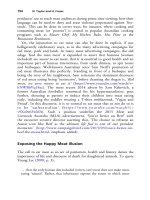The palgrave international handbook of a 328
Bạn đang xem bản rút gọn của tài liệu. Xem và tải ngay bản đầy đủ của tài liệu tại đây (33.58 KB, 1 trang )
326
J.E. Mazurek
Table 1 (continued)
Practice
Poor water quality
Inappropriate food levels
Health treatment
Deprivation of social contact
Inappropriate species
combinations/Unavoidable
contact with predators
Some demonstrated effects
on the health of fish
81 % of ornamental fish are held outside the
optimal pH range, 36 % at inappropriate
temperatures (Etscheidt and Manz 1992).
Poor water quality is the most common
cause of mortality in ornamental fish
(Schunk 1980).
Inappropriate range and types of food can
cause poor health in ornamental fish
(Etscheidt 1995). Inappropriate feeding is
not usually a direct cause of mortality in
ornamental fish, but can be a contributory
factor (Schunck 1980).
There is evidence therapeutic treatments
themselves may be stressful to fish (e.g.,
Yildiz and Pulatsu 1999; Griffin et al. 1999,
2002; Thorburn et al. 2001; Sørum and
Damsgard 2003).
Angelfish transferred singly to a new tank
take longer to resume feeding than those
transferred in groups of three or five
(Gomez-Laplaza and Morgan 1993).
Lack of appropriate social environment
(wrong species or inappropriate numbers)
is an important cause of poor health in
ornamental fish (Estcheidt 1995). In 19 %
of ornamental tanks, prey were housed in
small tanks in direct contact with predators
(Etscheidt and Manz 1992; Foggitt 1997).
Brief exposure to a predator causes
increased cortisol levels and ventilation
rate and suppressed feeding (e.g., Metcalfe
et al. 1987).
*The research compiled in this table is primarily based on studies of individual species
in the field of marine and fish biology. The categories and examples provided are
derived from a broad overview of the literature by Huntingford et al. (2006) and are
thus illustrative and not exhaustive. A more holistic and exhaustive review would
undoubtedly contribute to the animal abuse literature, but such an endeavour is
outside the scope of this chapter.
shaped by the marine aquarium fish trade itself. Utilizing the CITES3 Trade
Database, which monitors the trade in threatened and endangered species
including over 2,000 species of coral, Green and Shirley (1999, p. 1)
analysed the legal global trade in coral from 1985 to 1997 calculating that
the USA imported 56 % (just under 10,800 tonnes) of the total global









